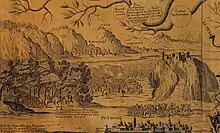
The Slovene peasant revolt (Slovene: slovenski kmečki upor, German: Windischer Bauernbund), also known as the All-Slovene Peasant Uprising (vseslovenski kmečki upor),[1] took place in 1515 and was the largest peasant revolt in the Slovene Lands. It engulfed most of what is now Slovenia as well as a significant portion of the province of Carinthia, which today is a part of Austria. There were about 80,000 rebels who demanded the reintroduction of the original feudal obligations and trade rights (the so-called "old rights"; Slovene: stara pravda) and a right to decide about the taxes. The spark which started this uprising was when the ethnic German peasants of the Gottschee region killed their lord Jorg von Thurn. They attacked the castles within the region, except in the territory of the County of Görz, where conflicts were solved through negotiations. The revolt was put down by the mercenaries of the Holy Roman Empire, with the deciding battle fought at Celje. The words stara pravda were printed in 1515 in Vienna in a poem of the German mercenaries and were the first printed Slovene words.[2]
References
- ↑ Kosi, Jernej (December 2018). "The textbook myth: Slovene peasants as heroes of the glorious past". Sprawy Narodowościowe. Seria Nowa. Institute of Slavic Studies, Polish Academy of Sciences (50). doi:10.11649/sn.1642. S2CID 166075986.
- ↑ Štih, Peter (2000). "Slovenski kmečki upor" [The Slovene Peasant Revolt]. In Vidic, Marko (ed.). Ilustrirana zgodovina Slovencev [The Illustrated History of the Slovenes] (in Slovenian). Mladinska knjiga. p. 142. ISBN 86-11-15664-1.